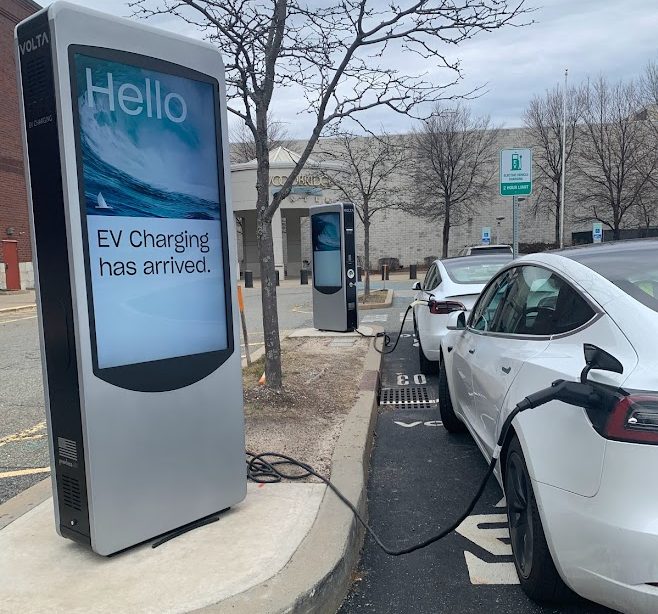In a significant, stride toward sustainability, Governor Phil Murphy announces his plan for New Jersey: “The state will cease the sale of gas-powered vehicles by the year 2035.” NJ.com explains, “The Advanced Clean Cars II (ACCII) mandate will require 51 percent of new car sales to be electric in 2027.” Currently, “Statewide figures show EVs made up 11% of car sales in 2023.”
This decision signifies the governor and state’s commitment to helping with the movement of climate change and reduced carbon emissions. “Increasing the use of electric vehicles is a critical step to secure New Jersey’s clean energy future,” said Governor Murphy. With the transition to electric vehicles (EVs), New Jersey aims to reshape its transportation sector and pave the way for a cleaner and brighter future.
But, is New Jersey’s infrastructure ready to handle this change? Better yet, are New Jersey’s residents ready for this mandated change?
Pros
The shift towards EVs brings forth an array of benefits for New Jersey, its residents and the environment. Firstly, by eliminating gas-powered vehicles, the state will significantly reduce its carbon footprint. Transportation emissions accounted for 35 % of greenhouse gas emissions in the state, the most of any sector. In addition, the shift to EVs will see cleaner air quality, effectively reducing air pollution throughout urban and rural regions.
Insider NJ reports, “Despite opposition, majorities of New Jerseyans anticipate the policy will have a positive impact on the state’s air quality (58 percent) and residents’ health (51 percent).”
In an article found in Governing, Alex Ambrose, the transportation and climate policy analyst for New Jersey Policy Perspective stated, “Our state needs to reduce our greenhouse gas emissions and air pollution and after this announcement, we are no longer sitting in the slow lane while other states pass us by on clean energy.”
Likewise, noise pollution levels will see a decline as the motors of electric vehicles produce less noise than traditional gas-powered vehicles. The problem of noise pollution cannot be downplayed as there are many harmful effects on the environment and animals because of it. Moreover, the promotion of EV adoption will improve the local economy by creating new job opportunities in manufacturing, charging infrastructure installation and maintenance.
This bill means that by 2030, over 90,000 more electric vehicles will be on the roads on New Jersey.
Cons
It is important to note that “ACCII is an administrative rule, not a law, and thus does not need to be approved by the state Legislature. However, a future administration can change course on New Jersey’s commitment to the regulation.”
Infrastructure readiness
While New Jersey leads the way toward an EV future, it is crucial to address concerns about the state’s infrastructure readiness. “When our fragile electric grid is already struggling to keep up with demand, it seems like an enormous risk to force all of our homes, businesses, and cars to electrify,” State Senator Steven Oroho, R- Sussex, said earlier this year. “There’s no redundancy and there’s no safety net.”
However, by collaborating with private sector companies, New Jersey intends to expand the charging network strategically and circumvent these concerns. They will deploy chargers at convenient locations such as grocery stores, shopping centers, and workplaces. Additionally, the state is committed to establishing fast-charging stations along major travel corridors, ensuring seamless long-distance travel for EV owners.
Battery Reliability and Consistency
Another potential concern following the EV transition is battery production and disposal. The production of EV batteries requires significant amounts of energy and raw materials, including rare earth metals. Additionally, the disposal of batteries at the end of their life cycle raises concerns about environmental impact and proper recycling methods. In addition, charging time may become a problem. This is because charging an EV takes longer compared to refueling a conventional vehicle with gasoline. While home charging overnight is convenient for many, long charging times can be a barrier for those who rely on public charging stations or need to recharge during a road trip.
Really Greener?
While the transition to electric vehicles helps reduce greenhouse gas emissions from tailpipe emissions, it is important to acknowledge that the electricity used to charge EV batteries is not always generated from renewable sources. Therefore, “zero tailpipe emissions” may be somewhat misleading to consumers. In a recent interview with Ms. Chantal Greffer, a science teacher at our school, she expressed her viewpoint, stating: “If the source of energy being used to power EVs doesn’t come from wind, solar panels, any other renewable energy source, then as a result CO2 emissions won’t see change.”
In many regions, electricity is still produced using non-renewable fuels such as coal, natural gas, or oil, which emit greenhouse gases during the generation process. Thus, the overall environmental impact of EVs depends on the energy mix of the grid. However, as renewable energy sources become more prevalent and the grid becomes cleaner, the environmental benefits of electric vehicles will continue to increase.
Interview
Ms. Chantal Greffer, Colonia High School adviser for the ecology club, expressed her viewpoint on the transition to fully electric vehicles commencing in 2035. According to her, the change should not be forced upon everyone in New Jersey without proper education and understanding. Greffer believes that it is essential to educate people about the benefits and drawbacks of electric cars before making such a significant shift. She brings up an interesting point because since consumers don’t typically know of the drawbacks, they may be blindly purchasing vehicles and potentially unaware of concerns that are overlooked, not talked about enough, or both.
Furthermore, it is important to address any potential logical fallacies in setting a specific goal, like stopping the sale of gas vehicles by 2035. While it is commendable to have a target for reducing carbon emissions, it is essential to consider the feasibility and practicality of such a goal. Factors such as technological advancements, market demand, and economic implications should be thoroughly evaluated to ensure a smooth and successful transition.
Overall, Ms. Greffer’s perspective highlights the importance of education and informed decision-making when it comes to transitioning to fully electric vehicles. Considering ethical considerations and avoiding logical fallacies will contribute to a more sustainable and effective shift toward a greener future.
Conclusion
Overall, New Jersey’s progressive decision to phase out gas-powered vehicles reflects a commitment to a cleaner and more sustainable future. The transition comes with many benefits, including improved air quality, job creation, reduced carbon emissions, and improved energy efficiency. By addressing concerns about infrastructure readiness and promoting the growth of charging stations, the state is making great strides toward ensuring a seamless transition. With New Jersey leading the way, the electrification of transportation is no longer a distant vision but a promising reality.










